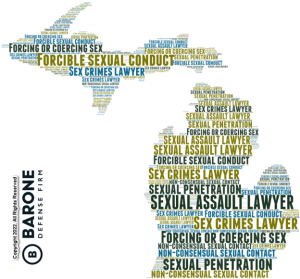Search
When Do I Need to Hire a Sex Crimes Attorney?
The short answer is – immediately. When it comes to sex crimes in Michigan, you should never take a “wait and see” approach. Sex crimes are taken very seriously in Michigan and carry with them severe penalties including long periods of incarceration.
Plus, sex crimes investigations are often extensive and could take weeks or months before any official charges are authorized. Authorized means an official charge against you, which usually begins when the investigating officer submitting their findings or report to the county prosecutor to review and approve, or authorize. If the prosecutor approves, the officer will then appear in court before a Judge or Magistrate and “swears to” a warrant for your arrest. Once the Judge or Magistrate sign it, there will now be a Felony Arrest Warrant for you.
If you have done something that might make you susceptible to a Criminal Sexual Conduct (CSC) charge, or other sex crime or assault, if you are suspicious that someone may be making a complaint against you, and certainly if you have been contacted by police or law enforcement, you must consult and retain an experienced assault and sex crime attorney immediately.
 Michigan Criminal Defense Lawyer Blog
Michigan Criminal Defense Lawyer Blog


















 Michigan Criminal Sexual Conduct, commonly referred to as CSC, is the unlawful sexual assault or touching or penetration of another. In Michigan, there are four separate offenses each defined by the acts of behaviors of the alleged offender.
Michigan Criminal Sexual Conduct, commonly referred to as CSC, is the unlawful sexual assault or touching or penetration of another. In Michigan, there are four separate offenses each defined by the acts of behaviors of the alleged offender. If you’ve been arrested for operating a vehicle while intoxicated,
If you’ve been arrested for operating a vehicle while intoxicated,